|
|
|
Sort Order |
|
|
|
Items / Page
|
|
|
|
|
|
|
| Srl | Item |
| 1 |
ID:
153772
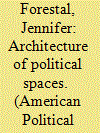

|
|
|
|
|
| Summary/Abstract |
The problem of trolls exemplifies the challenges of building democratic communities in the digital environment of social media. Distinguishing trolls from activists can be difficult; democratic theorists have yet to adequately address how to prevent the former while remaining open to the latter. In this article, I outline a theory of democratic politics that takes space as a central element in shaping democratic interactions. Using the work of John Dewey, I draw out two key characteristics of democratic space: boundedness and flexibility. Using these criteria, I then evaluate Kinja, Gawker Media's commenting platform, both before and after trolls attacked the site in 2014. I find that in altering its boundaries to successfully protect against trolls, Kinja introduced a new problem: a lack of flexibility that continues to affect the possibility for democratic discourse on the platform. I conclude by suggesting how this theory of democratic space might shape future research.
|
|
|
|
|
|
|
|
|
|
|
|
|
|
|
|
| 2 |
ID:
153767


|
|
|
|
|
| Summary/Abstract |
The prominence of colonization in Tocqueville's life and works has been widely noted, yet scholars disagree about its importance. The perceived tension between Tocqueville's analysis of democracy and his advocacy of colonization continues to be the subject of heated scholarly debate. Revisiting Tocqueville's analytical and practical engagement with colonization, this essay reexamines its relationship to Tocqueville's account of democracy. It argues that, while lending political support to the French empire, Tocqueville was a clairvoyant critic of colonial rule; and that his involvement with colonization could only be properly understood in light of the historical and civilizational vista that informs his oeuvre as a whole. Proposing that Tocqueville viewed European expansionism as an instrument of the global movement toward democratic equality, the essay concludes with an assessment of the significance of Tocqueville's colonial writings for his “new political science,” and their relevance today.
|
|
|
|
|
|
|
|
|
|
|
|
|
|
|
|
| 3 |
ID:
153768


|
|
|
|
|
| Summary/Abstract |
The much-discussed crisis of political parties poses a challenge to democratic theorists as institutional designers: how can the capacity of parties to mediate between society and state be resuscitated? In this article, we suggest that parties need to become more internally deliberative, allowing partisans to debate policy and more general visions for the polity. We outline a prescriptive model of deliberative intraparty democracy, drawing on the empirical literature on the changing structure of civic and political engagement. We argue that deliberative reforms are the most appropriate response to the demands of an increasingly more cognitively mobilized citizenry which seeks self-expression and nonhierarchical forms of political engagement. We highlight the model's distinctive strengths and defend it against several objections.
|
|
|
|
|
|
|
|
|
|
|
|
|
|
|
|
| 4 |
ID:
153765


|
|
|
|
|
| Summary/Abstract |
How does democracy work to improve well-being? In this article, we disentangle the component parts of democratic practice—elections, civic participation, expansion of social provisioning, local administrative capacity—to identify their relationship with well-being. We draw from the citizenship debates to argue that democratic practices allow citizens to gain access to a wide range of rights, which then serve as the foundation for improving social well-being. Our analysis of an original dataset covering over 5,550 Brazilian municipalities from 2006 to 2013 demonstrates that competitive elections alone do not explain variation in infant mortality rates, one outcome associated with well-being. We move beyond elections to show how participatory institutions, social programs, and local state capacity can interact to buttress one another and reduce infant mortality rates. It is important to note that these relationships are independent of local economic growth, which also influences infant mortality. The result of our thorough analysis offers a new understanding of how different aspects of democracy work together to improve a key feature of human development.
|
|
|
|
|
|
|
|
|
|
|
|
|
|
|
|
| 5 |
ID:
153775


|
|
|
|
|
| Summary/Abstract |
T his article argues against prevailing scholarly trends that the Florentine Histories continues to delineate the ways through which Niccolò Machiavelli, in The Prince and the Discourses, advised potential founders or reformers to exploit, for their own benefit and that of their patria, the inevitable social conflicts between elites and the people that arise in all polities. Machiavelli demonstrates that, in particular, Giano della Bella and Michele di Lando could and should have attempted to imitate exemplary ancient founders and reformers whom he praises in previous works, especially Moses, Romulus, and Brutus. Machiavelli implicitly criticizes Giano and Michele for failing to spiritedly invigorate new laws with necessary and salutary violence; for neglecting to effectively manage the “envy” of rival peers; for not resisting the allure of “middle ways” between difficult political choices; and for failing to militarily organize or mobilize the entirety of Florence's common people.
|
|
|
|
|
|
|
|
|
|
|
|
|
|
|
|
| 6 |
ID:
153771


|
|
|
|
|
| Summary/Abstract |
We study how representation works in a context where accountability to voters is restricted because of term limits and accountability to parties is limited because of party weakness. Analyzing all Brazilian mayoral elections between 1996 and 2012 using a regression discontinuity design, we show that becoming the incumbent party results in large subsequent electoral losses. We theorize that the presence of term limits, combined with political parties to which politicians are only weakly attached, affects the incentives and behavior of individual politicians in such a way that their parties’ suffer systematic losses. A descriptive analysis of an original dataset on the career paths of Brazilian mayors suggests that our assumptions are an accurate description of Brazil’s political context, and we find support for three central empirical implications of our theoretical explanation. Moreover, based on an analysis of additional data from Mexico, Peru, Chile, Costa Rica, and Colombia, we show that the negative effects found in Brazil also exist in other democracies.
|
|
|
|
|
|
|
|
|
|
|
|
|
|
|
|
| 7 |
ID:
153770


|
|
|
|
|
| Summary/Abstract |
Party-driven and religion-driven models of opinion change posit that individuals revise their positions on culture war issues to ensure consonance with political and religious predispositions. By contrast, models of issue-driven change propose that public opinion on cultural controversies lead people to revise their partisan and religious orientations. Using data from four panel studies covering the period 1992–2012, we pit the party- and religion-based theories of opinion change against the issue-based model of change. Consistent with the standard view, party and religion constrain culture war opinion. Contrary to the conventional wisdom, but consistent with our novel theory, opinions on culture war issues lead people to revise their partisan affinities and religious orientations. Our results imply that culture war attitudes function as foundational elements in the political and religious belief systems of ordinary citizens that match and sometimes exceed partisan and religious predispositions in terms of motivating power.
|
|
|
|
|
|
|
|
|
|
|
|
|
|
|
|
| 8 |
ID:
153776


|
|
|
| 9 |
ID:
153760
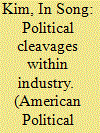

|
|
|
|
|
| Summary/Abstract |
Existing political economy models explain the politics of trade policy using inter-industry differences. However, this article finds that much of the variation in U.S. applied tariff rates in fact arises within industry. I offer a theory of trade liberalization that explains how product differentiation in economic markets leads to firm-level lobbying in political markets. High levels of product differentiation eliminates the collective action problem faced by exporting firms while import-competing firms need not fear product substitution. To test this argument, I construct a new dataset on lobbying by all publicly traded manufacturing firms from reports filed under the Lobbying Disclosure Act of 1995. I find that productive exporting firms are more likely to lobby to reduce tariffs, especially when their products are sufficiently differentiated. I also find that highly differentiated products have lower tariff rates. The results challenge the common focus on industry-level lobbying for protection.
|
|
|
|
|
|
|
|
|
|
|
|
|
|
|
|
| 10 |
ID:
153773
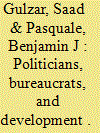

|
|
|
|
|
| Summary/Abstract |
When do politicians prompt bureaucrats to provide effective services? Leveraging the uneven overlap of jurisdictions in India, we compare bureaucrats supervised by a single political principal with those supervised by multiple politicians. With an original dataset of nearly half a million villages, we find that implementation of India’s National Rural Employment Guarantee Scheme, the largest employment program in the world, is substantially better where bureaucrats answer to a single politician. Regression discontinuity estimates help increase confidence that this result is causal. Our findings suggest that politicians face strong incentives to motivate bureaucrats as long as they internalize the benefits from doing so. In contrast to a large literature on the deleterious effects of political interventions, our results show that political influence may be more favorable to development than is commonly assumed.
|
|
|
|
|
|
|
|
|
|
|
|
|
|
|
|
| 11 |
ID:
153774


|
|
|
|
|
| Summary/Abstract |
Courts resolve individual disputes and create principles of law to justify their decisions and guide the resolution of future cases. Those tasks present informational challenges that affect the whole judicial process. Judges must simultaneously learn about (1) the particular facts and legal implications of any dispute; (2) discover the doctrine that appropriately resolves the dispute; and (3) attempt to articulate those rules in the context of a single case so that future courts may reason from past cases. We propose a model of judicial learning and decision making in which there is a complicated relationship between facts and legal outcomes. The model has implications for many of the important questions in the judicial process, including the dynamics of common law development, the path-dependent nature of the law, and optimal case selection by supervisory courts.
|
|
|
|
|
|
|
|
|
|
|
|
|
|
|
|
| 12 |
ID:
153763
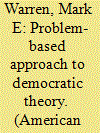

|
|
|
|
|
| Summary/Abstract |
Over the last few decades, democratic theory has grown dramatically in its power and sophistication, fueled by debates among models of democracy. But these debates are increasingly unproductive. Model-based strategies encourage theorists to overgeneralize the place and functions of ideal typical features of democracy, such as deliberation or elections. Here I sketch an alternative strategy based on the question: What kinds of problems does a political system need to solve to count as “democratic”? I suggest three general kinds: it should empower inclusions, form collective agendas and wills, and have capacities to make collective decisions. We can view common practices such as voting and deliberating as means for addressing these problems, and theorize institutional mixes of practices that would maximize a political system's democratic problem-solving capacities. The resulting theories will be both normatively robust and sufficiently fine-grained to frame democratic problems, possibilities, and deficits in complex polities.
|
|
|
|
|
|
|
|
|
|
|
|
|
|
|
|
| 13 |
ID:
153761
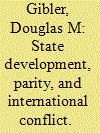

|
|
|
|
|
| Summary/Abstract |
This article explains the empirical connection between dyadic capability differences and international conflict as a consequence of how, when, and where states enter the international system. State capabilities are largely static, and, since states enter the system in geographic clusters, the processes of state maturation affect contiguous and regionally proximate states similarly. This makes dyadic capability differences static as well. The lack of change in capability differences over time suggests that the parity-conflict relationship is largely a product of the factors associated with state system entry. Indeed, as I demonstrate, several different proxies for the conditions of state system entry separately eliminate any statistical relationship between parity and militarized dispute onset, 1816–2001. I also find no relationship between parity and the wars that have occurred during that same time period. These results have a number of implications for the role of power and capabilities in explaining international conflict.
|
|
|
|
|
|
|
|
|
|
|
|
|
|
|
|
| 14 |
ID:
153764


|
|
|
|
|
| Summary/Abstract |
The article compares analytically populism and technocracy as alternative forms of political representation to party government. It argues that populist and technocratic principles of representation challenge fundamental features of party democracy. The two alternative forms of representation are addressed theoretically from the perspective of political representation. First, the article identifies the commonalities between the two forms of representation: both populism and technocracy are based on a unitary, nonpluralist, unmediated, and unaccountable vision of society's general interest. Second, it highlights their differences. Technocracy stresses responsibility and requires voters to entrust authority to experts who identify the general interest from rational speculation. Populism stresses responsiveness and requires voters to delegate authority to leaders who equate the general interest with a putative will of the people. While the populist form of representation has received considerable attention, the technocratic one has been neglected. The article presents a more complete picture of the analytical relationship between them.
|
|
|
|
|
|
|
|
|
|
|
|
|
|
|
|
|
|
|
|
|